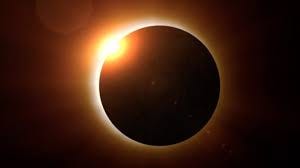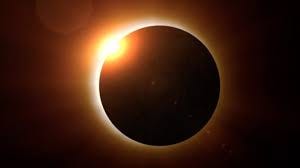A Note about the Solar Eclipse in India’s Spiritual Traditions
A Reckoning with the Inauspicious
Hindu traditions have complex interpretations of a solar eclipse but generally agree this is quite the inauspicious event. Some go as far as to regard it as a time of impurity, which requires dissociation—-like staying indoors, closing the temples, and otherwise staying away, followed by a ritual of repurification, such as a bath. Rarely is an eclipse regarded as propitious or a welcoming opportunity. But ancient India has always had diverse and often contrary interpretations, a testimony to the plurality of thought and reflection.
To put this in a simple linguistic context, none of the words in the Sanskrit language that mark an eclipse —-rahuparvan, rahugrasana, parigraha, marka—-suggest anything propitious. Each word conveys a sense of being surrounded, consumed, seized, possessed, or, you know, eclipsed.
There are a host of mythic associations, the most common involving the demon Rahu (more usually associated with the lunar eclipse). Rahu is a headless demon who comes to swallow the moon or even the sun but invariably fails because, well, he’s hasn’t the body to consume his prey. Other associations suggest an eclipse is a re-tellng of the churning of the Milky Ocean, the mythic event of dissolving and reorganizing the universe at the end of a cosmic era.
Some suggest a more auspicious situation: that this liminality provides opportunity, an opening in the seam of nature and of time that can be made advantageous by the recitation of mantra or meditation. You may hear suggested the recitation of the Gāyatrī mantra (Rg Veda 3.62.10). But the auspiciousness interpretation is hardly the predominant notion. An eclipse is generally not regarded as fortuitous, salutary, or propitious.
My teacher, ever sensible and willing to question his own traditions, had a few interesting ideas about why the solar eclipse is looked upon with askance.
Wisdom traditions are invested in understanding and predictive power. After all, “knowing” is in part to be able to see what is coming and why. Karma as causality and conditionality is problematic both when we can predict cause and effect and then even more so when we cannot. There’s little to suggest that ancient India had the tools to predict an eclipse of the sun. (But even if we suggest that such predictions were possible, it’s no less inauspicious—-the interruption is itself too unusual to be a good thing.) But the unpredictive places such an event in a category of stochastic terrorism. Not even the wise saw this coming and none could prevent it or stop it.
In other words, something untoward, unmanageable, and untimely simply happens without notice or recourse to actions in advance or the prevention that would make its occurrence less dangerous. That’s a clear signal for the demons involvement.
At least part of the work of the demons is to bring into our lives something unlucky, undisciplined, something that causes us consternation because we didn’t see it coming, we couldn’t see it coming. The “demonic” is not only a predictive or deliberate calamity or vice, it’s also about taking us off our marks, invoking panic, making us feel hapless or vulnerable to unforeseen events. An eclipse fits that bill and no character in the Hindu mythos is more closely associated with that than the headless Rahu who wanders the skies looking for opportunities to disrupt and dislodge us from ourselves.
Second, we know the dangers of looking at an eclipse without proper eye protection and it seems clear that traditional cultures did too. So how could such an event be deemed opportune or beneficial if its potential for harm is so plainly in evidence? Something so potentially dangerous to our health is by definition inauspicious.
Last, because animals respond with apparent confusion or enter nighttime behaviors, that too indicates to traditionalists that this is an unpropitious time. Things out of place are often regarded impure---inside your house we call it “dirt,” outside it is “soil.” So, an eclipse may be a strange rose in a corn field but it clearly does not belong, it’s out-of-placeness is thus impure and inauspicious. An eclipse is regarded even more so because it is so especially rare and abnormal---and when the animal world turns cautionary or behaves in such unusual ways, there’s reason to follow suit.
Of course, there are those who see such an event as such extraordinary liminality that it provides commensurate fortuity. Viewing the eclipse as a kismet, a rare chance to participate and witness an extraordinary natural event provides an auspicious trajectory and a wondrous experience. This is the interpretation my teacher preferred, though he respected the more traditional views.
An eclipse can be dangerous, as we know, and we should take proper care. Dangerous things invite prudence, care, and discerning judgment. But now that we are not terrorized by its unpredictability, we can turn an inauspicious event into something more like wonder, adbhuta, and a chance to learn and enrich experience. I hope you have an auspicious experience of the eclipse and, while you’re at it, do your best to keep the demons at bay. Take care!






Mahalo. I really appreciate this share.
Really appreciate your insights, Dr. Brooks. This was very interesting and I shared it with my colleagues at work. Below is an article about the public health dangers associated with the eclipse, for a variety of reasons. It does seem that respect that ancient traditions had for the eclipse may have been rooted in some scientific basis.
https://open.substack.com/pub/randomactsofmedicine/p/can-viewing-the-total-eclipse-be?r=kbkvl&utm_medium=ios